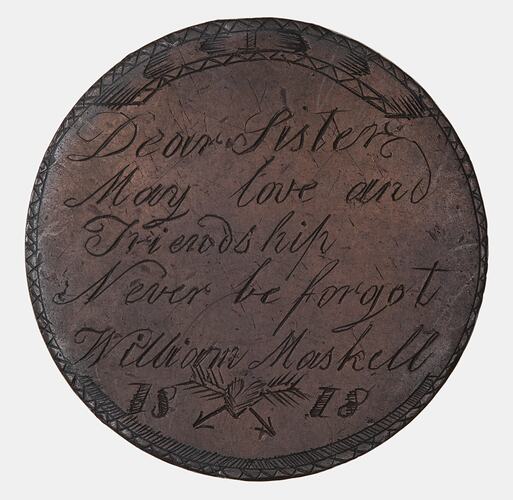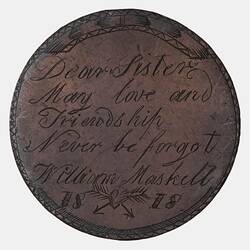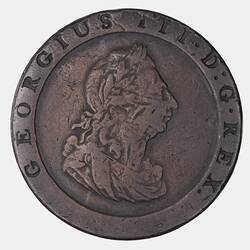Summary
Love Token from William Maskell to his sister dated 1818.
Love tokens were often commissioned by convicts before they were transported to Australia, as a memento for their loved ones. Itinerant engravers visited the prisons and hulks, finding a ready market for these tokens, which were made to order from smoothed-down coins.
Love tokens are evidence of the British Government's attitude to law and order and treatment of indentured labourers in a strict Government 'Assignment System' which provided cheap labour for the expanding British empire during the 1700s and 1800s.
About one third of migrants who came to Australia between 1830 and 1850 paid their own way. Convicts and settlers who came to Australia found that in comparison to Europe, conditions were very good and with hard work and determination they could prosper.
Physical Description
A love token engraved on the reverse of a 1797 British penny (36 mm). The obverse features a laureate bust of the King facing right; around incuse on broad rim, GEORGIVS III D.G. REX. The reverse of the penny been removed and engraved, above a heart pierced by two arrows, Dear Sister / May love and / Friendship / Never be forgot / William Maskell; the heart divides the date 1818. The edge is plain.
Obverse Description
A laureate bust of the King facing right; around incuse on broad rim, GEORGIVS III D.G. REX.
Reverse Description
The reverse of the penny been removed and engraved, above a heart pierced by two arrows, Dear Sister / May love and / Friendship / Never be forgot / William Maskell; the heart divides the date 1818
Edge Description
The edge is plain
More Information
-
Collecting Areas
-
Acquisition Information
Transfer from Melbourne Branch of Royal Mint, 11 Jan 1978
-
Date Issued
1818 AD
-
Issued By
-
Place & Date Inscribed
-
Inscriptions
GEORGIVS III D.G. REX Dear Sister May love and Friendship Never be forgot William Maskell 1818
-
Material
Copper
-
Axis
9
-
Classification
-
Category
-
Discipline
-
Type of item
-
Dimensions
36 mm (Outside Diameter)
-
Shape
Round
-
Keywords
Convicts, Families, Immigrant Voyages, Immigration, Love Tokens, Settlement, Travel


